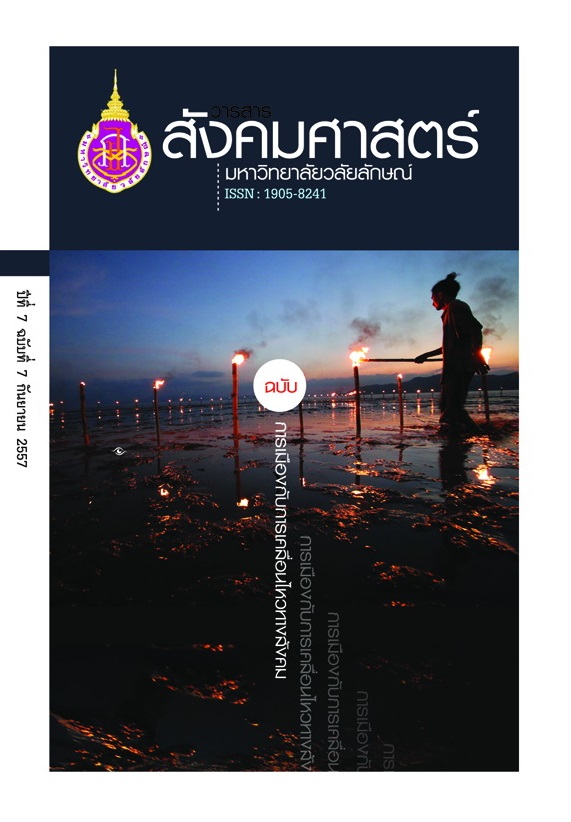Livelihood Strategies of Esan Farmers in Agri-food and Agro-fuel Business Context (in Thai)
Main Article Content
Abstract
At present day, Thailand face a price of oil problem. Government, State Enterprises and Private Sector search for solve this problem such as control the oil price, produce of the oil from agriculture or used oil. The changes of oil production context was affect to major and minor farmers including Agro-industry sector. This article was to understand and a study of livelihood strategies of Northeastern farmers and sugarcane-base fuel crops promotion policy in order to solve high petroleum prices, and to achieve energy security. In research question, when sugarcane in renewable energy context affected to the Production Relations, Food Securities and Livelihood Strategies, and focused on Nongraikai village, Koksa-ad subdistrict, Phukhiao District, Chaiyaphum Province. This study analyzed from Livelihood strategies conceptual framework including contractual production relations and food security concept to study the adaptations and negotiations of agriculture households. This study used qualitative research included such data-collecting techniques as in-depth interview with 106 households were studied including rice farmers, independent sugarcane farmers and sugarcane farmers under contract, heads of sugarcane groups and landless laborers as well as use of Spatial analysis and Descriptive statistical analysis.
Research findings the change of sugarcane to the agro-fuels context persuade more farmers enter to the agro-food and agro fuel industry with the sugar cane higher value, capital system and the good money welfare, consisted of livelihoods including changes in food security such as decline in household food availability and the changes of food security context, land use, farming systems and property rights. This led to adaptation and negotiation for survival in food production, land use, labor, work, resource use and management. Nevertheless, farmer’s livelihood strategies were not homogeneous. Their differences depended upon households’ capital, physical, resource use and economic limitations.
ยุทธวิธีการดำรงชีพของเกษตรกรอีสาน ในบริบทธุรกิจเกษตรและพลังงานทดแทน
ปัจจุบันประเทศไทยประสบกับปัญหาราคาน้ำมันแพง ทั้งหน่วยงานภาครัฐ รัฐวิสาหกิจ และเอกชน พยายามหาวิธีการเพื่อแก้ปัญหา ราคาน้ำมันแพง ทั้งการตรึงราคาน้ำมันและการ ผลิตน้ำมันที่มาจากภาคการเกษตรหรือน้ำมันใช้แล้วก็ตาม การเปลี่ยนแปลงเล็กๆ ในบริบท การผลิตน้ำมันนี้ได้กระทบต่อเกษตรกรทั้งราย ย่อยและรายใหญ่ รวมไปถึงภาคอุตสาหกรรม การเกษตร ผู้วิจัยจึงเขียนบทความนี้โดยมี วัตถุประสงค์เพื่อทำความเข้าใจและศึกษายุทธ วิธีการดำรงชีพของเกษตรกรในภาคอีสานกับ นโยบายพืชพลังงานที่ผลิตจากพืชอาหารประเภท อ้อย เพื่อแก้ไขปัญหาด้านราคาน้ำมันที่สูงขึ้น และความมั่นคงด้านพลังงาน ภายใต้คำถามวิจัย ที่ว่า เมื่ออ้อยในบริบทของการผลิตพลังงานทดแทนได้ส่งผลต่อความสัมพันธ์ทางการผลิต ความมั่นคงทางอาหาร และยุทธวิธีการดำรงชีพอย่างไร โดยศึกษาในหมู่บ้านหนองไรไก่ ตำบล โคกสะอาด อำเภอภูเขียว จังหวัดชัยภูมิ วิเคราะห์ผ่านกรอบแนวคิด ยุทธวิธีดำรงชีพ ร่วมด้วยแนวคิดความสัมพันธ์ทางการผลิตในระบบ เกษตรพันธสัญญาและความมั่นคงทางอาหาร เพื่อศึกษารูปแบบการการปรับตัวและการต่อรองของครัวเรือนเกษตรกร โดยการวิจัยเชิงคุณภาพ ด้วยการสัมภาษณ์เชิงลึกกับครัวเรือนในหมู่บ้าน 106 ครัวเรือน ได้แก่ กลุ่มชาวนา กลุ่มปลูกอ้อยอิสระ กลุ่มลูกไร่อ้อย กลุ่มหัวหน้าโควตา อ้อยรายใหญ่และรายย่อย และกลุ่มแรงงานไร้ที่ดินในหมู่บ้าน ร่วมด้วยการวิเคราะห์เชิงพื้นที่และวิเคราะห์ข้อมูลโดยใช้สถิติเชิง พรรณนา
ผลการศึกษาพบว่าอ้อยในบริบทที่เปลี่ยนแปลงสถานะจาก การเป็นแค่เพียงพืชอาหารสู่การเป็นพืชพลังงาน ทำให้อ้อยมีราคาและ มูลค่าที่สูงขึ้น และการจูงใจให้เกษตรกรมุ่งเข้าสู่ระบบการผลิตภายใต้ ระบบอุตสาหกรรมเกษตรอาหารและพลังงานมากขึ้น ด้วยระบบเงิน ทุนและสวัสดิการของโรงงาน ได้กระทบต่อรูปแบบการดำรงชีวิต ได้แก่ การเปลี่ยนแปลงความมั่นคงทางอาหาร เช่น การลดลงของ ปริมาณอาหารของครัวเรือนและการเปลี่ยนแปลงความหมายของ บริบทของความมั่นคงทางอาหาร การเปลี่ยนแปลงการใช้ที่ดินไปสู่ การปลูกอ้อยเพื่อส่งโรงงานมากขึ้น การเปลี่ยนแปลงระบบเกษตรและ ระบบสิทธิที่นำมาสู่การการปรับตัวและการต่อรองด้านการผลิตอาหาร การใช้ที่ดิน การใช้แรงงาน การทำงานเพื่อหารายได้ และการจัดการ ทรัพยากรเพื่อความอยู่รอดของครัวเรือน แต่ทั้งนี้ยุทธวิธีดำรงชีพของเกษตรกรไม่เป็นรูปแบบกันเดียวหมด ทั้งนี้ก็ขึ้นอยู่กับทุนการดำรงชีพ ลักษณะกายภาพ การใช้ทรัพยากรและข้อจำกัดทางเศรษฐกิจของแต่ละครัวเรือนที่มีอยู่
Article Details
Copyright: CC BY-NC-ND 4.0


